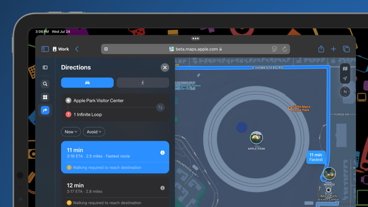Toshiba announces MacBook Air solid state drives available for sale
As noted by MacRumors, Toshiba's part numbers are exactly the same as the components found inside the MacBook Air. The internal solid state drives also come in the same three capacities: 64GB, 128GB and 256GB.
The components offer a maximum sequential read speed of 220MB per second, and a maximum sequential write speed of 180MB per second. The 64GB and 128GB Blade X-gale SSDs have a thickness of just 2.2mm, while the 256GB capacity is slightly thicker.
"Delivering a product that enables superior user experience in a smaller footprint is the ultimate goal," noted Scott Nelson, vice president, Memory Business Unit, Toshiba America Electronic Components, Inc. "The density of MLC NAND enables the creation of smaller form factor high density storage solutions, and Toshiba, as the technology leader for NAND storage solutions, will continue to innovate in this space."
The drives are available for sale to device manufacturers and bulk purchasers, meaning individual users will not be able to buy one direct from Toshiba.
Apple's newly redesigned MacBook Air comes with screen sizes of 11.6 inches and 13.3 inches. The smaller model can have up to 128GB of SSD storage, while the larger 13.3-inch MacBook Air can hold 256GB.
The availability of Toshiba's "blade-type SSD modules" to resellers and other component makers means users who need to replace or upgrade the solid state drive in their MacBook Air will have an easier time finding replacement parts.
The solid state drives allow the new MacBook Air models to offer instant-on capabilities when returning from sleep. The hardware on the 13-inch model is said to be comparable in terms of performance to Apple's 13-inch MacBook Pro, thanks to the speedy SSD found in the MacBook Air.
The thin and light profile and instant-on capabilities of Apple's new MacBook Air models have earned praise for making the notebooks similar to the popular iPad. It is expected that many of the same features, including standard solid state drives, will be extended to new MacBooks in the future as well.
 AppleInsider Staff
AppleInsider Staff













 Amber Neely
Amber Neely
 Thomas Sibilly
Thomas Sibilly

 William Gallagher
William Gallagher
 Malcolm Owen
Malcolm Owen
 Christine McKee
Christine McKee









43 Comments
Hopefully this means that solid state drives will replace their failure prone counterparts sooner rather than later in the average mid range notebook.
BB_Sting, I'd say Apple's trying to push that line right here, and seem to have teamed up with Toshiba to produce the drives required to pull it off.
This isn't just good for the MacBook Air, or even all Apple notebooks. Its good for notebooks in general.
This isn't just good for the MacBook Air, or even all Apple notebooks. Its good for notebooks in general.
To save money, I suppose one can have 2 drives in a notebook: (1) a SS drive with only 32 GB would be rather cheap and critical stuff should be stored there; (2) a spinning drive to store massive data.
Excellent, some good tech to produce some thin notebooks meaning everyone that wants something fast and light doesn't have to go visit the fruit shop.
(2) 1TB drives would be sexy